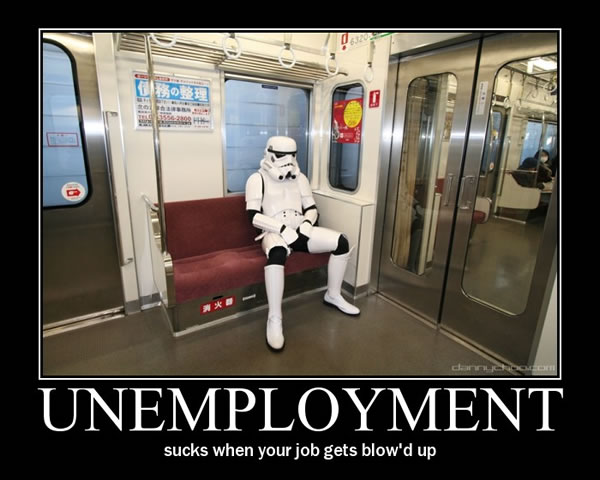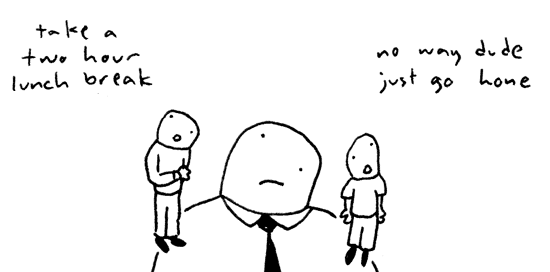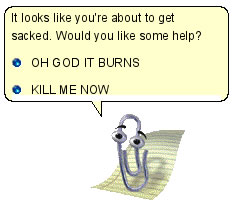[This article also appears in my tech blog, Global Nerdy.]
Introduction

Hello. My name is Joey deVilla, and I am unemployed.
Hmmm. Let’s try that again.
Hello. My name is Joey deVilla, and I am between jobs.
That has a much better ring to it. An optimistic, “this too shall pass” kind of vibe. Maybe the third time will be the charm.
Hello, My name is Joey deVilla, and today is Day One of a new chapter in my career.
There we go.
The Credit Crunch and the Job Market
Many people are in the same situation.
Even if you take only my industry — the software and web industry — into account, a lot of people are feeling the same pain. The unemployment rate in our hub, Silicon Valley, has gone up for the fourth consecutive month and hit 6.6%, its highest level in four years. People who follow the industry are writing articles warning us that it’s not if you’ll get laid off, but when. Even Robert Scoble, who’s probably one of the most sunny and optimistic tech bloggers out there has recently written articles with titles like Surviving the 2008 Recession and What to Do if You’re Laid Off in the 2008 Recession.

The “Bailout Protest” march on Wall Street.
It’s bad all ’round. As I write this, a Google News search for the term “financial crisis” yields just shy of 200,000 results. There are articles with titles like:
- The Next Decade Could be Our Very Own Great Depression
- Financial Turbulence: Pass the Airsick bags
- Credit Crunch Banker Leaps to His Death in Front of Express Train
- Anger, fear and deadlock, then President Bush sums it up: ‘This sucker could go down’
- In Financial Crisis, Metaphors Fly Like Bad Analogies
When the news is filled with talk of credit crunches, bank bailouts and poorly-thought-out metaphors, you can be certain that every business is adjusting their plans to ensure that it doesn’t go under. Cutting spending is one of the most important of these adjustments, and since employee salaries are expenses, companies are laying off the employees they believe they can do without and slowing down (if not stopping) their hiring.
This is not a good time to look for a job nor lose one.
What to Do?

Losing your job is a shaming, stress-inducing, heart-rending, and even frightening experience at the best of times. Losing your job at the start of what some people in the media are calling the New Great Depression is far worse, even if you think they’re exaggerating for effect.
In the time since I posted the article in which I announced that I had been let go, I’ve received about a dozen emails from people who’ve said that they’re in the same situation. They have no idea what to do and asked me what I was doing and if I had any advice.
I have some observations and suggestions, some of it from my layoff experience back in 2002 and some of it from the past few days’ experiences, and I’ve written them below.
You Will Know When You’re Called in for “The Meeting”

I knew I was being brought in for the “your services are no longer required” meeting the moment I was invited to it.
Many people dismiss intuition, but in experience, I have found that a well-trained intuitive sense will often serve you well in those situations where the situation is murky or when rationality is following the wrong path. I susbscribe to the theory that intiuition is your brain doing some massively parallel processing, subconsciously “filling in the missing pieces” when you are presented with incomplete information. That’s why Poincare said “It is through science that we prove, but through intuition that we discover.”
It might have been something in the Director of Tech’s voice or his body language. Perhaps it was that there’d been little for me to do in the past little while because of the overlap between our jobs. Maybe the fact that the meeting had been called up out of the blue with no explanation as to what it was about was the tip-off. All these hints would be clear to a detached observer, but to someone right in the middle of the situation, they might not be so apparent. Thanks (or no thanks, perhaps?) to a flash of intuition, I had a pretty good idea of what I was in for.
A quick aside: I believe that intuition is not independent of learning and experience, but enhanced by it. When intuition “fills in the missing pieces”, it has to get those pieces from somewhere. Without learning, and even more importantly, the regular application of that learning, intuition is no better than flipping a coin.
You Have Moments to Get a Grip
Armed with that intuitive flash, I had the twenty or so seconds’ travel time between my desk and the meeting room to collect myself. At this point, I only had a vague sense that this was my termination meeting; intuition isn’t a straight-forward thing like a warning light on your car’s dashboard or a pop-up window on your computer:

“Clippy” dialog created using imageGenerator.net’s Clippy Image Generator.
Do whatever it takes to steel yourself for the bad news. Whether it’s deep breathing, couting to ten, reciting your own personal mantra or firing up your “poker face”, you want to get ready to conduct yourself at the meeting with as much grace, aplomb and professionalism as you can muster.
The Second Most Important Meeting You Might Ever Have with Your Employer

I’ll admit that my termination meeting wasn’t as uncomfortable as this one.
(In case you were wondering, the most important one is the job interview.)
I used to work as a DJ at a popular campus pub at Crazy Go Nuts University. Both the atmosphere and the vantage point offered by the DJ booth gave me the opportunities to witness many breakups from a detached third-party point of view, whether I want to see them or not. Even at their best, breakups are pretty rough; when they get ugly, you can’t help but feel shame for the couple.
No matter what you’re feeling at the meeting, you want your termination to be as good a breakup as possible. This means that you must handle the meeting professionally. The way you behave at this meeting will set the tone for your termination. If it is full of freak-outs and acrimony, they won’t be inclined to do you any favors. On the other hand, if you conduct yourself in a professional manner, you may gain some goodies such as extra negotiating leverage and a willingness on their part to do what they can for you.
If you can remember these questions through the stress of the meeting, you should ask questions like:
- When is my last day?
- What is my severance package?
- How long will my company insurance coverage last?
- When do I have to return the company laptop and Blackberry?
- How long do I have to collect my stuff from the office?
- What do you want me to do with my current projects and files?
- Can I get a letter of recommendation and use you as a reference? (Naturally, if you’re being fired rather than laid off, don’t bother asking this question.)
Don’t worry about memorizing these questions — just remember that you should leave the meeting with a clear idea of what they expect from you and what you can expect from them.
If they’ve given you papers to sign, do not sign them yet. Ask for some time to “look them over”.
Take a Walk as Soon as Possible

This is going to sound terribly touchy-feely new-agey, but I’m going to say it because it’s an important step: at your first opportunity, take a break, get out of the office and go for a walk.
When this first opportunity comes depends on the sort of place where you were and the conditions under which you’re being let go. In some cases, you’ll be asked to pack your things and leave immediately, sometimes with a minder assigned to you so that you don’t go pilfering office supplies. In my case, I was asked to say on for a few days to be debriefed and help with the transfer of responsibilities.
Since I was at the office for a few more days and since it was the sort of place where they’re pretty cool about going out for a break, I went for that walk at the first opportunity. (Besides, what were they going to do, fire me?)
The walk is important because it gets you away from the office and to clear your head. Regular readers of this blog know that I’m usually an easy-going, “go with the flow” kind of guy who’s seen and done some pretty crazy things, and even I needed that walk. I felt twitchy and drained at the same time.
The walk gives you a chance to come down from one of the most stressful experiences you’ll ever face in your working life and come to terms with what’s happened. It is not the time for figuring out what your immediate next steps are; it is the time to collect yourself for figuring out what your next steps are.
Don’t do the walk in a fugue state. Take note of your surroundings. Chances are you’ll see things that you passed by every day but never noticed before. This is good, because it’s preparation for what you’re going to be doing for the next little while: seeing things differently.
Deal with the Shame
No matter how good a job your were doing or how well you served the company, being let go will make you feel like thie cat pictured below:

It will feel as if you had been weighed in the balance and found wanting. In fact, that’s what probably happened. Perhaps you weren’t found wanting as a person or an employee, but when the bean-counters did the books, either you went or the company did.
Thanks to evolution, being let go feels terrible. It feels like getting dumped, which feels terrible because it means that you are failing your biological imperative to keep the species going. Without this feeling, we don’t have the drive to reproduce and thrive, and it’s “goodbye species”.
You deal with the shame, using whatever constructive coping mechanisms work best for you. In my case, I hit the gym, did a little writing, played a little music on the ol’ squeezebox and got involved in some very severe rocket-launcher-assisted altercations in Grand Theft Auto IV.
If you must, have a drink or two but don’t go beyond that. You want to take the edge off, not go on a binge.
You Must Come to this Realization
Crank up your computer’s speakers and enjoy the video below. It’s the Soup Dragons’ 1990 cover of the Rolling Stones’ I’m Free. Don’t be afraid to shake your booty if you feel the urge:
If you need to, play the video a couple of times just to make sure the song’s point soaks in: you’re free.
Once the initial shock of losing your job has worn off, consider this: the future has suddenly become a blank slate. That may sound scary, but you should think of it as liberating.
Think about it. That end-of-the-week progress report that management expects? Not your problem anymore! Getting a response from that contractor for the 50-page spec for that increasingly complicated e-commerce website that you’re responsible for? Somebody else has to deal with it now! Hunting down the bug in the credit card payment gateway? Rubbing an irate client’s belly? Putting new covers on the TPS reports? You’re free of all those responsibilities.
All the day-to-day stuff that you’ve been doing at work has just vanished. This frees you to stop worrying about the doing things for the company and start doing things for you. Without those things taking up your time and thoughts, both your calendar and your mind are free to concentrate on “You, Incorporated”.
In the Next Installment
The next steps, including what you can do with all that spare time.
16 replies on “Terminated, Part 1: The Very First Things You Should Do When Laid Off”
Great tips, Joey! Best of luck with the job hunt!
Losing your job is ass, Joey, but the blog is perfect.
Sorry to hear about the layoff, Joey.
I have the opposite problem. I’ve been looking for a tech head/web developer for my small bootstrap company for 2 years, to no avail. Developers want anywhere from 80k to 150K, which is more than I make! [Like I said, we’re small, and bootstrapped, but have solid steady income]
Any tips for an employer looking for someone (perhaps just a couple of years out of school) that wants experience as a DBA/Network Admin/Web Programmer?
Somewhere down the road, perhaps you can do another post that talks about what a small, non-venture backed company can do to hire techies. I’m tired of doing everything by myself.
Good luck in your search.
I.
I’m a couple of weeks ahead of you (i.e. it happened to me a few weeks ago) and your post rings so true.
One thing a friend also told me: make a sacrifice to the economic karma gods – a significant but frivolous purchase, which reminds them they need to help you find your next job so you can continue to make offerings. I bought a new lens for my camera.
I bought a new lens for my camera.
I’ve got a few PM leads that I’ll forward on to you.
buck up Paly, you are the poor man’s Guy Kawasaki. Call yourself an _______ Evangelist, after all!
maybe it’s time to go all in on an accordion career.
break a leg, Joe.
T
Great post, Joey. Waiting raptly for part two.
Maybe you’re planning to get to this Joey, but getting laid off in the little recession of 1999 was the best thing that ever happened to me. I ran my own business for 7 years based on that, mostly consulting and contract programming for companies that didn’t want to hire an employee, but were happy to hire a contractor for more than an employee would make, as long as there were no strings attached.
Things that helped get that ball rolling: I immediately put word out on my social network that I was available for contract work. That got me in front of about 50 companies on the same day I packed up my office. Since many of the companies that ended up hiring me being big, with lag-times of up to six months to negotiate contracts, that was a very big deal.
I had a corporation set up, and immediately began tracking legitimate business expenses for tax purposes.
It also had helped that my layoff came just after I’d paid off my last credit-card. It would have been much harder to survive that start-up lag if I’d been sending my money off to banks for toys I had already broken.
And then once those things were in order, I headed to the “big box” grocery store, and stocked up on “college student food” and bought a bus-card. My living expenses had to be cut, and I managed to halve my cost of living, since I only drove when absolutely necessary, and quit eating out except for business lunches.
Once that was all done, my typical day was 6 hours of “work”: looking for contracts, working on shareware (to demo my mad skillz), and updating my website. I used the rest of the free time until the first job started to go for walks and bike-rides and generally get myself in better physical and mental shape. Looking and feeling good makes it a lot easier to wow them in the interview.
Oh man! that really sucks!
Wendy will be a good sugar mama?
Thinking of you and hope to see you soon!
Adina
Good luck, Joey. I expect you’ll land on your feet just fine.
As it happens, my job is much the same kind of position as the one you have just left, so I’ve been looking over my shoulder quite a lot lately.
And here is some more advice from the Manager Tools guys;
http://www.manager-tools.com/help-with-recent-market-turmoil/
I don’t check your blog for a few days and you get *laid off*???
Stupid economy!
Here’s an opportunity for you…
http://toronto.en.craigslist.ca/tor/muc/855193085.html
I’m at the tail end of a month-long jobsearch. Luckily, I have three offers to choose from. What is below is from an uncle of mine, VP of HR of a company in Chicago & much smarter about all this than I (it’s skewed to IT because I’m a web developer, but still applies to most searchers). This was extremely helpful in keeping me focused and setting goals:
Steps in a job search:
1. Update the resume. In your case, go with a resume that focuses on education and competencies (your skills). Rather than emphasize where you worked and how long, You want to highlight the accomplishments and the skills you used.
2. Work contacts. Anybody you know that might hear about a IT job is a possible contact. Make a list of contacts and add people to it as you run across new names. Start with past supervisors, clients, business people and add keep building the list. Keep a log of the contacts and notes of your interactions – dates and comments. Call people and tell them you are on the market and ask them to keep you in mind should they hear of a possible opportunity. Ask them if they have any advice that might help with your search. People resent being asked for a job, but they do not mind being asked for advice. I would work the list with monthly calls or the frequency that makes sense to you. Ask if they know anyone, a search firm or a business that you might want to contact. You are trying to get your name in front of people who might hear about jobs or employers with openings.
3. Search firms: I have literally sent resumes to 1000 search firms when actively looking for a job. Some will ask if you are listed elsewhere. I would answer that I was listed with a few but you do not want to admit to more than that. I would think that you would list with at least 25 search firms. You want to list with ones that specialize in IT jobs. A cover letter to a person at the firm and a copy of your resume suffice. The cover letter describes your job interests – locations and types of jobs and money range. The resume is your marketing piece. Don’t pay a lot of attention to the geographic location of the search firm. It does not mean much. The reason you list with multiple firms is that Firm A will have a different set of clients and jobs than Firm B and so forth. More listings means more exposure.
4. Spend some time thinking about the different kinds of jobs that you would consider and the minimum compensation. Most people would have at least two or three preferred job situations, a few geographic locations and a compensation range for each geographic area or job type. Don’t get sucked into interviewing for jobs outside your interest unless it is an employer you really want. Some search firms will keep you busy knowing someone will hire you if they trot you out to enough places. Only consider search firms where the employer (ER) pays the fee. Do not give any of these outfits money for their services. Think about what kind of ER’s might have need for your services. Who do you target?
5. Libraries have info on local employers or state employers. You can look up companies by looking in stock listings (find addresses or names or contacts). Of course, a lot of that is on internet now as big ER’s all have websites. Libraries help job seekers find this info.
6. The state employment service will have jobs listed. Many of these will be lower level but may be worth time to stop by and get info to look at their job listings. It at least shows which ER’s are hiring and these could be worth sending a resume or dropping one off at their door.
You are attractive in terms of age and years of experience and you speak English. You are at the level where a lot of ER’s will be looking. You may have to take something quickly but that does not mean you stop looking for the type of job and ER that you really desire.
I use to use something called “Directory of Executive Recruiters” published by Kennedy. They put out a new one each year. The library will have it. It will list search firms geographically as well as by specialty. It will help you find search firms that specialize in IT. IT magazines will also have ads from some of these outfits. You can bet there are two or three search firms in Phoenix that specialize in IT. You need to find out who they are and get to know someone at each.
Hang in there. Looking for a job can be a full-time job.
[…] gave us 37signals, Flickr, del.icio.us and others. The tightening financial belts will leave many developers out of a job. But this is really about managing costs, building solutions that deliver value to real customers. […]
I was told effective friday i no longer had a position there. There was nothing given to me in writing. Was i terminated? When i clarified then your telling me not to come in on monday. They said yes, that i would be resigning. I said i would not resign. That i needed a letter stating i was being let because of budget problems and not performane based. I was hen told i was not being layed off, that i was being offered a transfer. What happens if i don’t except the transfer. I feel they are being sneeky with their wording. Can i still apply for unemployment?
I was searching google and your blog popped up. Man, if your tips and tricks don’t ring true! The best part was the video you posted – LOVED IT. I’m not above saying I danced a little jig in my kitchen LOL* I had planned in advance when I saw what was happening, so I was well prepared for it. The company sucked the life out of me and oddly I now feel invigorated for my next big adventure…….which may well be “Me incorporated” Thanks buddy- you cheered me greatly.
Thanks buddy- you cheered me greatly.
Shauna